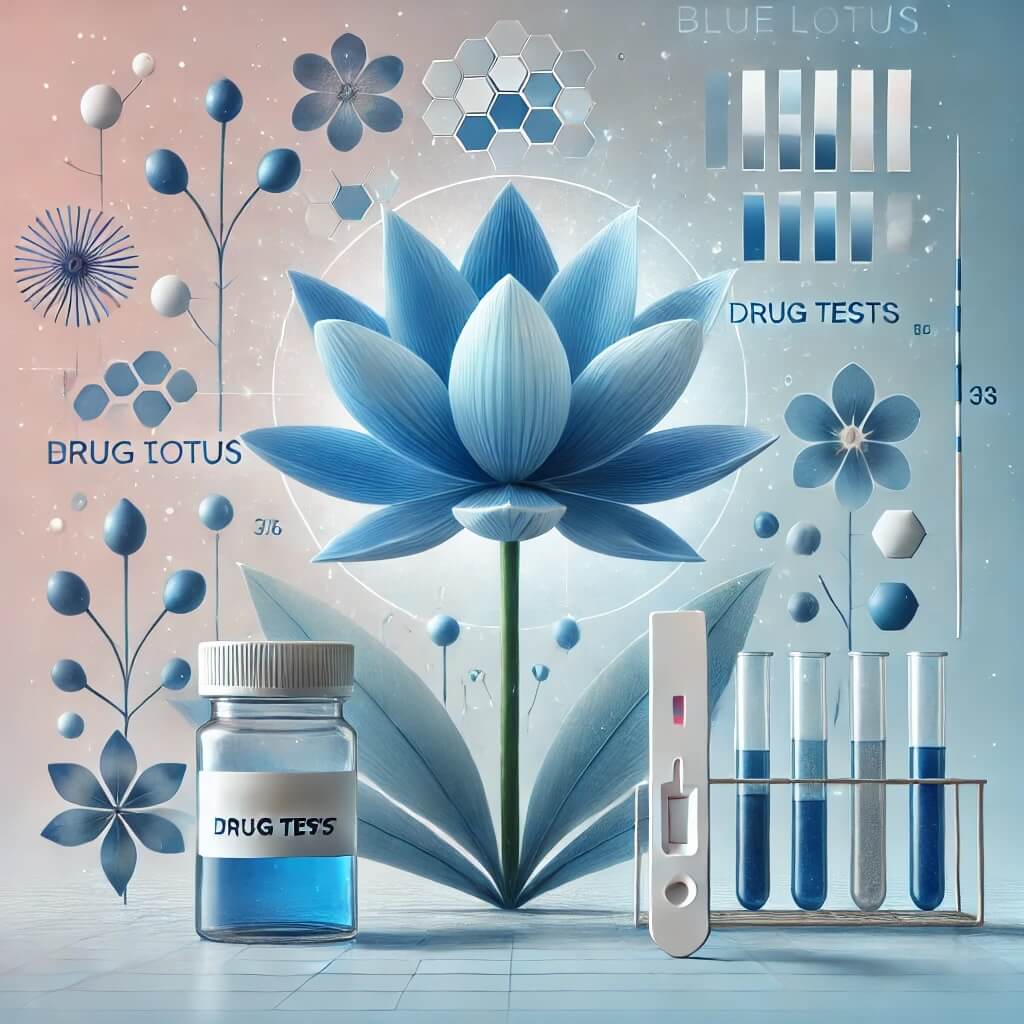Currently, there is no evidence to suggest that Blue Lotus or its active compounds—aporphine and nuciferine—are detectable on standard drug tests. Drug tests are designed to identify specific controlled substances and their metabolites, which Blue Lotus does not contain. The compounds in Blue Lotus are not among those commonly screened for in urine, blood, or hair drug tests.
Does Blue Lotus Show Up on Drug Tests?
The resurgence of interest in natural and herbal supplements has brought many ancient remedies into the spotlight, with Blue Lotus (Nymphaea caerulea) being one of the most popular. Known for its calming effects and rich history in ancient Egyptian culture, Blue Lotus is now available in various forms, including teas, tinctures, and even vapes. As its popularity grows, so does the curiosity about its impact on modern-day concerns, such as drug testing. A common question among potential users is: “Does Blue Lotus show up on drug tests?”
Understanding Blue Lotus and Its Compounds
Blue Lotus, also known as the Egyptian Lotus, has been revered for centuries for its mildly sedative and psychoactive properties. The flower contains several active compounds, most notably aporphine and nuciferine, which are responsible for its calming effects. These alkaloids interact with the dopamine and serotonin receptors in the brain, inducing a state of relaxation and mild euphoria. Despite these effects, Blue Lotus is not considered a controlled substance in most countries and is often sold legally as an herbal supplement or for use in aromatherapy.
The Mechanics of Drug Testing
To understand whether Blue Lotus might show up on a drug test, it’s essential to first understand how drug tests work. Standard drug tests, such as the commonly used urine drug test, are designed to detect specific substances or their metabolites in the body. These substances typically include illegal drugs like cocaine, marijuana, opiates, amphetamines, and sometimes certain prescription medications. The tests work by identifying the presence of specific biomarkers that indicate drug use.
Why Blue Lotus is Unlikely to Be Detected
There are several reasons why Blue Lotus is unlikely to show up on a drug test:
1. Lack of Specific Testing: Standard drug tests do not screen for aporphine or nuciferine, the active compounds in Blue Lotus. Since drug tests are tailored to detect specific illegal drugs and their metabolites, Blue Lotus is not included in the panel of substances that are tested.
2. No Known Metabolites: The metabolites of Blue Lotus alkaloids are not well-studied and are not known to mimic those of other substances that are typically tested for. Without a clear biochemical pathway that overlaps with illegal drugs, it’s unlikely that using Blue Lotus would result in a false positive.
3. Legal Status: Blue Lotus is not classified as a controlled substance in most countries, including the United States. This legal status means that there is little reason for it to be included in drug testing protocols designed to detect illegal or controlled substances.
4. Anecdotal Evidence: Users of Blue Lotus have reported no issues with drug testing after consuming the herb in various forms. This anecdotal evidence, combined with the lack of scientific basis for detection, suggests that Blue Lotus use is unlikely to interfere with standard drug testing.
Considerations for Specific Scenarios
While Blue Lotus itself is unlikely to cause a positive drug test result, there are a few scenarios where caution is advised:
1. Combination with Other Substances: If Blue Lotus is used in combination with other substances, especially those that are controlled or illegal, it is possible that the other substance could be detected on a drug test. Users should be mindful of what they combine with Blue Lotus, especially if they are subject to regular drug testing.
2. Specialized Drug Tests: In rare cases, employers or authorities may conduct specialized drug tests that go beyond the standard panel. These tests could potentially include a broader range of substances, though it is still highly unlikely that Blue Lotus would be among them. However, if you are concerned about this possibility, it’s worth consulting with a healthcare provider or the testing authority.
3. Heavy Use: While normal consumption of Blue Lotus is unlikely to cause any issues, excessive use could theoretically lead to a buildup of its compounds in the body. Although still unlikely to trigger a positive drug test, users who consume large amounts of Blue Lotus regularly should be aware of the potential for unknown factors to arise.

